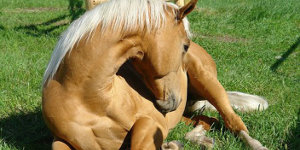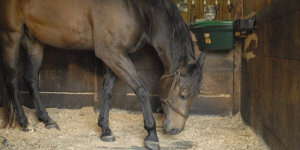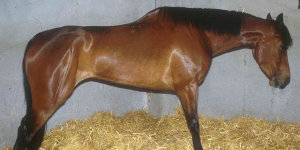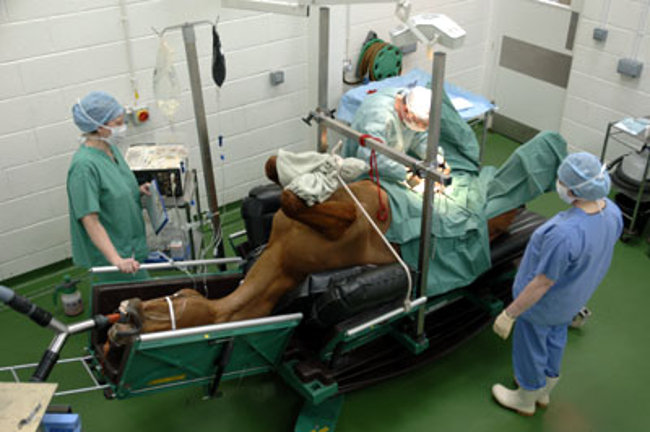Colic Advice
Colic is a word that strikes fear into the heart of most horse owners – but what does colic mean and what are the management changes you can implement to try and help prevent it?
Overall, colic is a term that encompasses all types of abdominal pain – the clinical signs your horse may present with are…
-
Pawing the ground
-
Rolling
-
Flank watching
- Frequently lying down and getting up
Other lesser associated signs include…
-
Inappetence
-
Lethargy
-
Sweating
-
Yawning
- Stancing to urinate but not actually urinating.




Types of Colic?
There are 2 main categories of colic…
-
Medical – these are usually treatable via your first opinion vet at the yard. Types of medical colic include; intestinal spasms, gas build up or mild impactions
- Surgical – these types of colic require referral to a hospital and surgery to correct. Types of surgical colic: severe blockages, twists, displacements or trapped pieces of gut.
Medical colic as a rule tends to present with lower level signs of pain such as flank watching, pawing and your horse being mildly- moderately uncomfortable.
As vets we will use parameters such as heart rate, gum colour and level of gut noise to try and determine what the cause of colic may be and therefore which category they are. Any history of diet or management changes can also help us identify what type of colic could be most likely.
After an initial exam we would, in most incidences, progress to a rectal exam to try and feel for what the problem is and any evidence of something surgical. We will also often pass a tube into their stomach via their nose. This is to provide fluids and assess if there is any fluid sitting in their stomach (reflux), another indicator for a surgical colic.

What to do if you think your horse is colicing?
If you are concerned your horse is starting with colic please ring one of us on our mobile, or if its out of hours ring 01434 606033 and pressing option 1 will put you through to the vet on call.
Remove all hard feed and hay initially but leave water accessible.
If safe to do so walking in hand or light lunging can help alleviate suspect gas colic. (we suggest that if horses are being walked, they are adequately rugged etc. for the weather conditions)
Encourage fluid intake with warm molasses water alongside their normal water.
If your horse has a suspect surgical colic
As colic is unfortunately a common equine emergency it is beneficial to have a plan in place in case the worst should happen. Firstly, deciding if colic surgery is an option for your horse before the event will make decision making at the time much less stressful. Also, if you have insurance, checking if you are covered for colic can also prevent emotional and financial stress later in the process.
As with most equine emergencies timing is crucial and if your horse is diagnosed with a surgical lesion the quicker these decisions are made, and the sooner they make it to a surgical facility the better the overall prognosis. A delay of several hours in a horse with intestinal strangulation (where the blood supply to the intestine is lost) can change the prognosis from good to extremely poor
We would like to add that equine abdominal surgery is not without its risks and the recovery period for such an operation also needs to be taken into consideration. If your horse is diagnosed with a surgical lesion and surgery is not an option (either for management, financial or other reasons) then realistically euthanasia is the only other option, but this will always be discussed with you prior to any decisions being made.
How can I try and prevent colic?
Unfortunately, most surgical colic is due to pathology of the equine gut and cannot be predicted or prevented. However, certain management factors can lower the risk of colic developing such as…
-
Regular worming at the correct time of year and dosing to the correct weight (see http://www.intakevets.co.uk/equine-worming or speak to one of us for more information)
-
When the cold weather hits ensuring horses are offered warm water/ sloppy feeds to encourage fluid intake and preventing impaction colic.
-
Change of pasture or hay/haylage suddenly may predispose to impaction colic.
-
Regular, good quality dental work to prevent impactions from forage not being adequately chewed.
- Some horses benefit for a pre and probiotic supplement to ensure the hind gut bacteria are stable and helps prevent spasmodic and gas colics.
If your horse is prone to colic or you have any questions regarding the management of colic please get in touch with Nick, Suzie or Beckie.
